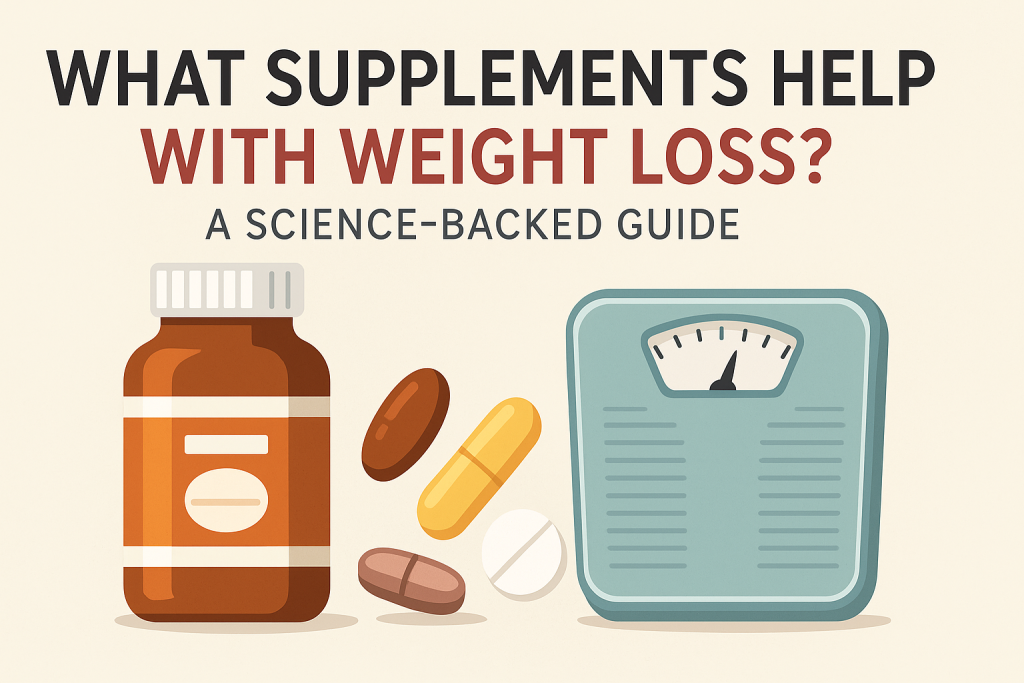The pursuit of weight loss is a common goal for many individuals seeking to improve their health, boost confidence, or enhance athletic performance. While proper nutrition and regular exercise remain the cornerstones of effective weight management, supplements for weight loss are increasingly popular. But which supplements truly help with weight loss, and how do they work? This article explores the science behind popular weight loss supplements, their benefits, potential risks, and expert recommendations for safe, sustainable results.
How Do Weight Loss Supplements Work?
Weight loss supplements are formulated to enhance the body’s ability to lose weight through several mechanisms. These include:
- Increasing metabolism: Boosting the rate at which the body burns calories.
- Reducing appetite: Helping you feel full and consume fewer calories.
- Decreasing fat absorption: Reducing the amount of fat your body absorbs from food.
- Enhancing energy levels: Improving physical activity and calorie expenditure.
It’s important to recognize that no supplement can replace a healthy lifestyle, but the right product may offer some support when combined with diet and exercise.
Top Supplements That May Help With Weight Loss
Below are some of the most popular and scientifically studied supplements that help with weight loss.
1. Caffeine
Caffeine is a well-known natural stimulant found in coffee, tea, and various weight loss supplements. Caffeine boosts metabolism and increases fat burning in the short term. Studies suggest that it can increase energy expenditure by 3-11%, making it one of the most effective natural fat burners.
Potential Side Effects:
- Insomnia or disrupted sleep
- Jitters or increased heart rate
- Anxiety
Best For: People who tolerate stimulants well and are not sensitive to caffeine.
2. Green Tea Extract
Green tea extract is rich in antioxidants called catechins, especially EGCG (epigallocatechin gallate), which is believed to aid fat burning. Green tea extract may boost fat oxidation and slightly increase calorie burning, particularly when combined with caffeine.
Potential Side Effects:
- Digestive discomfort
- Headaches
- Mild insomnia (if caffeine-sensitive)
Best For: Those seeking a natural, antioxidant-rich supplement to support metabolic health.
3. Glucomannan
Glucomannan is a natural dietary fiber derived from the konjac root. When taken before meals, it absorbs water and expands in your stomach, promoting a feeling of fullness and reducing calorie intake.
Potential Side Effects:
- Gas and bloating
- Stomach cramps
- Possible interference with medication absorption
Best For: Individuals seeking an effective appetite suppressant.
4. Garcinia Cambogia
Garcinia cambogia is a tropical fruit whose rind contains hydroxycitric acid (HCA), purported to help block fat production and suppress appetite. However, results from studies are mixed, with some showing modest weight loss and others showing little effect.
Potential Side Effects:
- Digestive upset
- Headaches
- Liver issues (rare)
Best For: Those interested in herbal supplements, though results may vary.
5. Conjugated Linoleic Acid (CLA)
CLA is a type of fatty acid found in meat and dairy, often marketed as a fat-burning supplement. Some research indicates that CLA may promote modest fat loss, but the effect tends to be small and may vary between individuals.
Potential Side Effects:
- Digestive issues
- Potential for increased inflammation
Best For: People looking for a supplement to support fat loss along with exercise.
6. Protein Supplements
Protein powders (such as whey, casein, or plant-based blends) can support weight loss by promoting satiety, maintaining muscle mass, and enhancing calorie burning through the thermic effect of food.
Potential Side Effects:
- Bloating (in lactose-intolerant users with whey protein)
- Allergic reactions (for some plant-based proteins)
Best For: Anyone needing help to meet daily protein goals and support body composition.
7. Fiber Supplements
Soluble fiber supplements such as psyllium husk or inulin are linked to increased satiety, reduced appetite, and lower calorie intake. Fiber also promotes gut health, which can indirectly impact weight regulation.
Potential Side Effects:
- Gas and bloating
- Discomfort if increased suddenly
Best For: Those struggling to get enough fiber from diet alone.
Supplements With Limited or No Evidence
While the above supplements have some scientific backing, many products lack substantial evidence or pose potential health risks. Examples include raspberry ketones, bitter orange (synephrine), and certain “proprietary blends.” Always exercise caution and seek professional advice before using these supplements.
Are Weight Loss Supplements Safe?
The safety of weight loss supplements varies based on ingredients, individual health status, and dosage. Some supplements may interact with medications or exacerbate health conditions. Common risks include increased heart rate, digestive issues, insomnia, and, in rare cases, more severe health problems.
Key Tips for Safety:
- Choose reputable brands with transparent ingredients.
- Consult your doctor before starting any supplement, especially if you have medical conditions or take prescription medications.
- Follow recommended dosages to avoid adverse effects.
- Monitor your body’s response and stop use if you experience negative symptoms.
How to Maximize Results With Supplement Use
Remember, no supplement can replace the foundations of a healthy lifestyle. To achieve and maintain weight loss:
- Focus on a calorie-controlled, nutrient-dense diet.
- Engage in regular exercise, including both cardio and strength training.
- Get adequate sleep and manage stress levels.
- Use supplements as an adjunct—not a replacement—for healthy habits.
Keeping realistic expectations is crucial—supplements may offer a small boost, but long-term success relies on sustainable changes.
Expert Recommendations
Most health experts agree that while certain supplements can assist with weight management, their effects are often modest. The best approach is a holistic one: combine evidence-based supplements with nutrition, exercise, and lifestyle changes for optimal results.
Always research products carefully, avoid miracle claims, and remember that consistency and patience are key in any weight loss journey.
Conclusion: Which Supplements Help With Weight Loss?
Several supplements—including caffeine, green tea extract, glucomannan, CLA, protein, and fiber—have evidence supporting their role in weight loss. However, supplements should be used wisely and only as part of a broader, healthy lifestyle plan. Consult with a healthcare professional to determine the best course of action for your individual needs. Weight loss is a marathon, not a sprint—choose safe, science-backed tools to support your journey.


